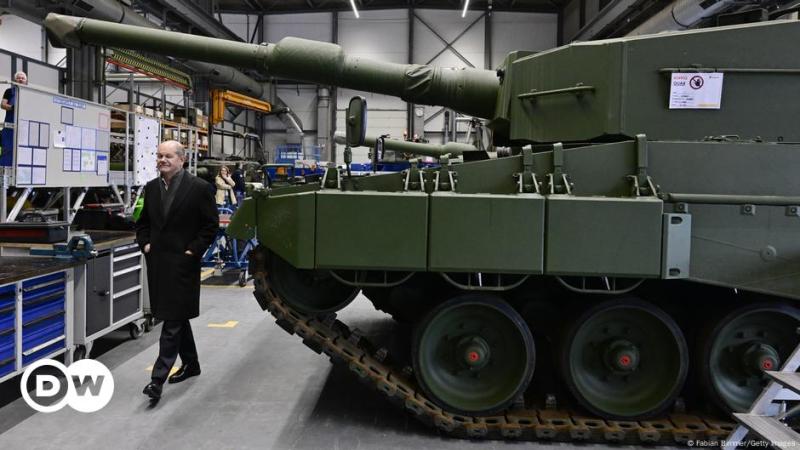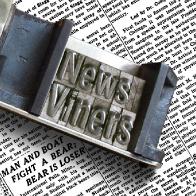German support for Ukraine under pressure from populists
By: Christoph Hasselbach (dw. com)


An emerging problem for the next President to deal with. Germany has adopted a more assertive role in NATO, challenging US dominance to some extent. But that move appears to have been motivated, in part, by internal politics. The increasing influence of Germany's former Soviet half could upset the apple cart. The far-left and far-right political parties are beginning to establish consensus positions that lend support for creating a governing coalition that would be at odds with the status quo western ideologies that have controlled Europe since the end of WWII.
If Germany adopts a more friendly stance toward Russia then the future of NATO really is in doubt. European politics, in general, seem to be changing in ways that highlight NATO as an anachronism. Will the next President try to save the NATO past or will the next President turn the page and move on?

The populist BSW and far-right AfD parties, both of which did well in recent state elections in Saxony and Thuringia, are opposed to arms deliveries to Ukraine. This stance is having an impact on federal politics.
"We support Ukraine in its resistance to Russia's war of aggression. Obviously, we will continue to do so," said a spokesperson for the German government after the state elections in Saxony and Thuringia.
But is it really that "obvious" after the election success of the Alternative for Germany (AfD) and the Sahra Wagenknecht Alliance (BSW)? Both parties want to end military support for Ukraine and improve relations with Russia.
Although foreign policy decisions are not made at the state level, it was an important topic in the election campaign. Sahra Wagenknecht made the election a vote on war and peace, and the leader of the AfD in Thuringia, Bjorn Hocke, said: "These elections in the east will also decide whether this country leaves the path to war or whether it continues in the direction of escalation."
'Many in the east fear an escalation of the war'
Statistics highlight the problem that the German government, which according to Chancellor Olaf Scholz intends to support Ukraine "for as long as necessary," is facing with this sentiment, especially in eastern Germany.
According to this year's Allensbach Security Report, 76% of respondents in the east fear Germany could be drawn into a military conflict, compared with 44% in the west. In the July survey by pollster infratest dimap, 36% of respondents nationwide said arms deliveries to Ukraine had gone "too far." In the east, that figure was 50%.
"Many in the east fear an escalation of the war through further arms deliveries," said Katja Hoyer, a historian from the eastern German state of Brandenburg who now lives in the UK. "In recent weeks, I've heard the argument time and again that Russia can't be defeated anyway, and that further support for Ukraine would only provoke it unnecessarily and delay the war."
In an email to DW, she said she believes this perspective may also stem from the experience in East Germany under Soviet control. "The Soviet Union was one of two world powers; the reverence that many in the East felt for the Soviet Union has been transferred to today's Russia — and not so much to the West." Moreover, according to Hoyer, people's view of the Soviet Union in the former East Germany was not completely negative.
Saxony State Premier Michael Kretschmer echoed this sentiment during the election campaign and has long called for a "freeze" on the war in Ukraine. This caused some consternation in his center-right Christian Democratic Union (CDU), the largest opposition party in the Bundestag, where many see Kretschmer's demands as a betrayal of Ukraine.
The CDU has unfortunately let itself be pushed around by "two Kremlin offshoots," wrote CDU foreign policy expert Roderich Kiesewetter in an email to DW, in reference to the AfD and BSW.
"A 'freeze' on the war would result in massive war crimes in the occupied territories and the deployment of soldiers by Western states to secure the front line; it would serve as a blueprint for other aggressive countries and result in millions more refugees and displaced persons having to flee to Germany and Western Europe," said Kiesewetter. He attributes the mood in the east to a widespread "romanticization of Russia, distortion of history, and anti-Americanism."
And yet, Kretschmer was able to strike a chord with voters in Saxony. Likely due in part to his criticism of support for Ukraine, the CDU narrowly edged out the right-wing AfD, which has no qualms about rooting for Russia.
Coalition talks a stress test for the CDU
In the upcoming coalition negotiations in Saxony and Thuringia, the question "What is your position on support for Ukraine?" will have very concrete consequences. In both states, there is a good chance that the CDU will head the next government, but it will need coalition partners. The CDU has ruled out an alliance with the AfD, but not with the BSW.
Before the elections, Wagenknecht made it clear that her party's entry into a coalition would depend on the Ukraine issue. "We will only be part of a state government that also takes a clear position for diplomacy and against preparations for war at the federal level," she said.
Since the elections, however, Wagenknecht has struck a softer tone. She has said a state government involving the BSW must publicly communicate that it would like to see more "diplomatic initiatives" from the federal government to end the war in Ukraine and that it does not support arms deliveries to Kyiv "on this scale."
'BSW is the long arm of the Kremlin'
Can the BSW get its way? "That is unlikely to be a big challenge in Saxony," said historian Katja Hoyer. "Kretschmer spoke out clearly against arms deliveries from the very beginning."
Hoyer believes, however, that the situation in Thuringia is different. There, the AfD emerged as the strongest party, 10 points ahead of the CDU. "The BSW can and will put pressure on the CDU, which did not win the election," Hoyer predicted. "Almost half of the electorate there voted either for the AfD or the BSW, meaning for a party that is friendly to Russia. Even if Wagenknecht has ruled it out, a coalition of BSW and AfD would have a majority in the state parliament. This gives the BSW quite a lot of leverage to demand concessions from the CDU."
Kiesewetter, on the other hand, strongly advises against making concessions to the BSW. "The BSW is the long arm of the Kremlin and goes against all the values for which the Union [CDU and its Bavarian sister party CSU] have traditionally stood: peace through freedom and self-determination, international law, democracy and a commitment to the West." To cooperate with the BSW "would be tantamount to self-destruction," he added.
One way out could be for both sides to acknowledge that the states are not responsible for the situation in Ukraine, while vaguely committing themselves to peace efforts. At the federal level, however, the issue is by no means settled.
Public support for Ukraine is eroding, especially in eastern Germany. The longer the war drags on, the more difficult it will be for the German government to continue its policy of support. And the issue is likely to come to the fore again in 2025, with the federal election set for September 28.








The political changes happening in Germany (and the rest of Europe generally) may well be harbingers of the final end of the post-WWII era. The United States and United Kingdom may be the last holdouts standing against the whole of Europe.
What will the next President do?